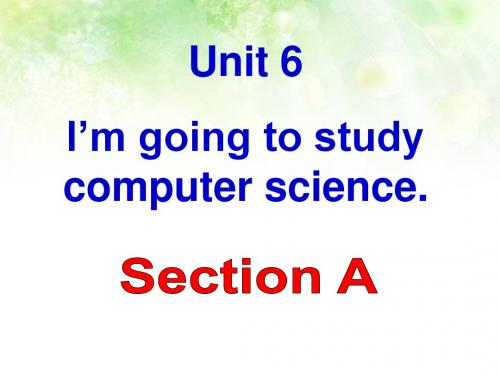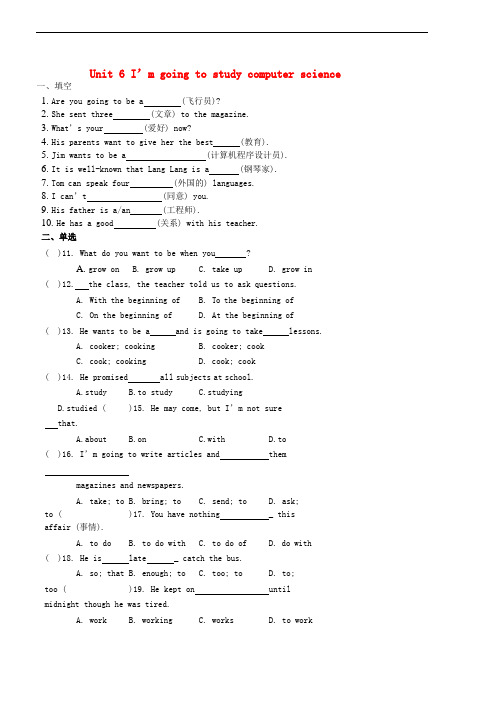2018年unit 6 I’m going to study computer science知识点总结
- 格式:doc
- 大小:103.00 KB
- 文档页数:4

《I'm going to study computer science. Section B 2a-2e》作业设计方案(第一课时)一、作业目标本次作业旨在帮助学生进一步理解和掌握计算机科学相关词汇和表达,同时锻炼他们的口语和书面表达能力,提升跨文化交流能力。
通过作业,希望学生能够:1. 熟练掌握与计算机科学相关的词汇和表达;2. 能够用英语描述自己的计算机科学学习计划;3. 增强跨文化交流意识,提高英语沟通能力。
二、作业内容1. 词汇练习:学生需完成一份与计算机科学相关的词汇练习题,包括选择、填空、翻译等题型。
题目应涵盖计算机科学的基本概念和术语。
2. 口语作业:学生需准备一段关于自己未来计算机科学学习的演讲,主题为“我打算学习计算机科学”,内容包括学习动机、学习计划、遇到的困难和解决方式等。
要求语言流畅、表达清晰。
3. 书面报告:学生需撰写一篇关于计算机科学的短文,主题为“我对计算机科学的认识和兴趣”,内容包括对计算机科学的理解、未来职业规划等。
要求语法正确、逻辑清晰、字迹工整。
4. 文化交流:学生需阅读一篇与计算机科学相关的英文文章,并与其他同学进行讨论,分享各自对计算机科学的认识和感受,增强跨文化交流意识。
三、作业要求1. 按时完成作业,确保质量;2. 词汇练习需认真完成,掌握相关词汇;3. 口语和书面作业需用英语完成,表达准确、流畅;4. 文化交流部分,学生需积极参与讨论,提高自己的跨文化交流能力。
四、作业评价1. 作业批改:教师将对每位学生的作业进行批改,针对不同题型给出分数,并对共性问题进行讲解;2. 课堂展示:挑选部分学生在课堂上进行口语和书面作业展示,鼓励他们分享自己的学习计划和感受,增强互动和交流;3. 成绩评定:根据学生的词汇练习、口语和书面作业以及课堂表现,综合评定本次作业成绩,作为平时成绩的一部分。
五、作业反馈部分为了更好地了解学生对作业的反馈和意见,我们将设置以下反馈渠道:1. 课后与学生交流:教师在课后与学生交流,了解他们对作业的感受和建议;2. 设立班级交流群:建立班级交流群,鼓励学生之间互相交流和分享;3. 收集反馈意见:收集学生对作业的反馈意见和建议,以便改进今后的教学工作。


Unit 6 I’m going to study computer science一、填空1.Are you going to be a (飞行员)?2.She sent three (文章) to the magazine.3.What’s your (爱好) now?4.His parents want to give her the best (教育).5.Jim wants to be a (计算机程序设计员).6.It is well-known that Lang Lang is a (钢琴家).7.Tom can speak four (外国的) languages.8.I can’t (同意) you.9.His father is a/an (工程师).10.He has a good (关系) with his teacher.二、单选( )11. What do you want to be when you ?A.grow onB. grow upC. take upD. grow in( )12. the class, the teacher told us to ask questions.A. With the beginning ofB. To the beginning ofC. On the beginning ofD. At the beginning of( )13. He wants to be a and is going to take lessons.A. cooker; cookingB. cooker; cookC. cook; cookingD. cook; cook( )14. He promised all subjects at school.A.studyB.to studyC.studyingD.studied ( )15. He may come, but I’m not surethat.A.aboutB.onC.withD.to( )16. I’m going to write articles and themmagazines and newspapers.A. take; toB. bring; toC. send; toD. ask;to ( )17. You have nothing _ thisaffair (事情).A. to doB. to do withC. to do ofD. do with( )18. He is late _ catch the bus.A. so; thatB. enough; toC. too; toD. to;too ( )19. He kept on untilmidnight though he was tired.A. workB. workingC. worksD. to work( )20. He writing when he was ten.A. takes upB. took upC. put upD. turn up三、根据方框里的词语填空take, listen, make, is, help, learn, areResolutions 21. promises to yourself. They may22. to make you a better person and to make your life easier.I am going to 23. four resolutions.The first resolution is about my own personal improvement. Next year, or maybe sooner, I am going to 24. up a new hobby. I think singing 25. _ a great activity so I am going to 26.to sing. I think this will also make my family happy because they love to 27. to music and sing together.四、将对话补充完整,每空一词A: Kelly, what do you want to be 28. you grow up?B: I 29. to be a doctor.A: Wow! 30. are you going to do that?B: I’m 31. to study medicine at a university.A: Hmm… sounds difficult. 32. are you 33. to study? B: I’m going to 34. _ in London.A: 35. are you going to start?B: I’m going to 36. _ next September.五、连词成句37.are, going, to, grow up, be, what, when, you, you38.grades, get, I’m, good, going to39.piano, brother, take, and, to, going, I, my, lessons, are40.some, vegetables, readers, more, eat, are going to41.is going to, to, the articles, magazines, Li Lin, send【参考答案】11—15:BDCBA 16—20:CBCBB四、21. are 22. help 23. make 24. take 25. is 26. learn 27. listen五、28. when 29. want 30. How 31. going 32. Where 33. going 34. study 35. When 36. start六、37.What are you going to be when you grow up?38.I’m going to get good grades.39.My brother and I are going to to take piano lessons.40.Some readers are going to eat more vegetables.41.Li Lin is going to send the articles to magazines.。



《Unit-6-I’m-going-to-study-computer-science》教学设计Step 3:While- listening “Big Wheel”to consolidate them.【设计意图】巩固词汇,为听力做准备。
老师与学生之间对话互动,学生生成关于未来职业的词汇,体现了师生共生理念。
Task 2:Show a list of jobs, students rank them in groups according to interests. 1 is the most interesting, 12 is the least interesting.【设计意图】小组将职业排序的过程,会自动生成Why,即学生为什么这样排序,学生说出排序原因的过程就是思考的过程。
体现了生生共生的理念。
Step 3:While-listeningTask1: Listen and fill in the blanks.Since students have mastered words of jobs, the way to realize their dream jobs is necessary to be mentioned.教学过程教学环节主备人备课执教教师二次备课Step 3:Post- listening Task 2: GamesMatch the items.Match the job to the activity. Students continue to discuss about more activities to realize their dream job. .【设计意图】再次讨论,学生探究出更多更多实现自己理想职业的活动,体现了生生共生理念。
Step 3:Post-listeningTask1Practice the conversation in the picture. Then make conversations about the otherStep 4:Pre-listening (Activity 2 ) Step 5:While-listeni ngStep 6:Post- listening Step 7:Summary:Step 8:Homework jobs in 1a.S1:What do you want to be when you grow up ?S2:I want to be a...S1:How are you going to do that?S2:I'm going to...Task 2:GamesEach picture contains a game which makes students to practice the sentence pattern in 1c.【设计意图】通过游戏形式进行操练,有趣且能激发学生的学习兴趣。
《I'm going to study computer science. Section B 2a-2e》作业设计方案(第一课时)一、作业目标本节课的作业旨在帮助学生巩固和拓展他们在Section B中学习的关于计算机科学的相关词汇和表达,同时通过实际应用,增强学生对计算机科学的理解和兴趣。
作业的目标包括:1. 熟练掌握Section B中的相关词汇和表达;2. 了解计算机科学的实际应用;3. 提高英语阅读和写作能力。
二、作业内容1. 阅读理解:学生需要阅读一篇关于计算机科学的短文,并回答相关问题。
问题将围绕短文的内容,涉及计算机科学的各个方面。
2. 词汇练习:学生需要完成一份与Section B相关的词汇练习题,包括填空、选择和翻译等类型。
通过练习,学生可以进一步巩固和拓展词汇知识。
3. 写作任务:学生需要写一篇短文,介绍自己将来打算学习计算机科学的原因和动机。
要求使用正确的语法和表达,同时注意文章的结构和连贯性。
4. 小组讨论:学生可以组成小组,讨论计算机科学对社会和个人未来的影响,并准备向全班汇报。
小组讨论有助于培养学生的合作精神和交流能力。
三、作业要求1. 作业应在规定时间内完成,并确保答案的正确性和质量;2. 写作任务应使用自己的语言,避免使用模板和抄袭;3. 小组讨论应确保每个成员都积极参与,并做好记录和汇报准备。
四、作业评价1. 教师将对作业进行批改,并给出反馈和建议;2. 学生将根据教师的反馈,对自己的作业进行修改和完善。
五、作业反馈教师将在下次课堂上向学生反馈作业情况,包括优秀作品和需要改进的地方。
同时,教师也将鼓励学生分享他们在完成作业过程中的体会和收获,以促进学生的自我反思和互相学习。
通过本次作业,学生将有机会将所学知识应用于实际,从而加深对计算机科学的理解,激发对未来职业规划的热情。
教师将根据作业情况,针对Section B中未掌握的知识点进行进一步讲解,以确保所有学生都能达到预期的学习目标。
《I'm going to study computer science. Section A 1a-1c》作业设计方案(第一课时)一、作业目标1. 帮助学生进一步理解并掌握Section A 1a-1c的课文内容,了解关于计算机科学的相关信息。
2. 通过练习,提高学生们的口语表达和听力理解能力。
3. 培养学生的兴趣和自信心,鼓励他们了解并探索计算机科学。
二、作业内容1. 阅读理解:学生需阅读Section A 1a-1c的课文,完成相关习题,进一步理解课文内容。
题目设计应注重细节和推断,以培养学生的阅读理解能力。
2. 听力训练:学生需听录音,完成相关听力理解题目。
题目应涉及课文中的关键信息,以提高学生的听力理解能力。
3. 口语表达:学生需用自己的语言描述课文中的关键信息,并表达对计算机科学的兴趣和未来规划。
此部分可采用小组讨论或角色扮演的形式,以培养学生的口语表达能力。
4. 写作练习:学生需根据课文中的关键信息,写一篇短文,描述自己对计算机科学的认识和未来规划。
此部分旨在培养学生的写作能力,并帮助学生深入思考自己的未来规划。
三、作业要求1. 独立完成作业:学生需独立完成作业,不得抄袭或由他人代写。
2. 按时提交:作业应在规定时间内提交,逾期不候。
3. 认真对待:学生应认真对待作业中的每一道题目,确保答题的准确性和完整性。
4. 小组合作:在小组讨论或角色扮演中,学生应积极参与,尊重他人观点,共同完成作业。
四、作业评价1. 教师根据作业中的习题正确率、作文质量和小组讨论表现进行评价。
2. 教师根据学生在作业中的表现,了解学生对课文的理解程度和兴趣点,为后续教学提供参考。
3. 教师需对优秀作业进行展示和表扬,激励学生积极参与作业,提高学习效果。
五、作业反馈部分1. 学生可根据教师反馈,针对自己的不足之处进行改进和提高。
2. 学生可向教师提出疑问或建议,以帮助教师更好地改进教学。
3. 教师需关注学生的反馈,及时调整教学策略和方法,提高教学质量。
Unit6 I’m going to study computer science一、词性转换1.violin名词(表人)violinist 小提琴家2.piano名词(表人)pianist 钢琴家3.science名词(表人)scientist科学家4.drive名词(表人)driver 司机cation形容词educational 有教育意义的6.send过去分词sent7.foreign名词(表人)foreigner 8.mean名词meaning9.discuss名词discussion 10.begin名词beginning重点讲解:1puter programmer bus driver basketball player【拓展】(1) 动词后加erlisten→listener 听众 read → reader 读者 teach → teacher 教师 clean→ cleaner 清洁工 sing →singer 歌手 work → worker 工人 farm→ farmer 农夫 own→ owner 主人 play → player 运动员 wait →waiter 服务员(2) 以e结尾的加rwrite →writer 作家 dance→dancer 舞蹈演员 drive → driver 驾驶员(3) 在动词后加orvisit→visitor 参观者 invent→ inventor 发明者 act→actor 男演员2. violin →violinist; Piano n → pianist【拓展】 -ist 是一个名词后缀,加在某些名词或动词后面,可用来表示“从事某种职业的人“ piano→ pianist science→ scientist art →artist 艺术家3. I’m going to move to Shanghai.。
【解析】 move v 移动,搬动 move to + 地点搬到某地A. pianoB. driverC. pilotD. scientist 3. I’m going to move to Shanghai.。
【解析】 move v 移动,搬动 move to + 地点搬到某地4. My parents want me to be a doctor, but I’m not sure about that.【解析】sure adj. 确信的be sure about 确信 make sure 确保(1)be sure +about / of +名词、代词或动名词对…有把握She is sure of success. 她确信会成功。
(2) be sure to do sth 务必;确信I’m sure to go with you. 我确信和你一起去(3) be sure +that We are sure that you can make great progress this term.(4)▲ make sure + that 从句Make sure that you can find out the truth soon. 确保你能很找出真相。
▲make sure to do sth 务必干……▲ make sure of sb./ sth 弄清楚某人/事二、短语归纳1. grow up 成长2puter programmer 计算机程序设计员3.a basketball player 篮球运动员4.study computer science 学习计算机科学5.become a writer 成为一位作家6.be sure about 确信;对……有把握7.make sure 确保;查明8.take acting lessons 上表演课9.take singing lessons 上音乐课10.go to a cooking school 去烹饪学校11.move to Shanghai 搬家到上海12.send them to magazines and newspapers 把它们寄给杂志社和报社13.learn to play the piano 学习弹钢琴14.make the soccer team 组建足球队15.get lots of exercise 多锻炼 16.take guitar lessons 上吉他课17.learn another foreign language 再学一门外语 18.take piano lessons 上钢琴课19.make resolutions 下决心;制定计划20.the meaning of.. ……的意思21.a kind of promise 一种承诺22.at the beginning/start of the year 在新年刚开始的时候23.write down 写下;记下24.different kinds of resolutions 不同种类的决心25.have to do with 关于;与……有关系26.take up 学习做;开始做27.make a weekly plan 制订每周的计划28.make promises to sb. 向某人保证/承诺三、重点语法be going to 结构的用法用“be going to”结构表示将来要发生的事,或打算、计划,决定要做的事情。
常与表示将来的tomorrow,next year等时间状语或when 引导的时间状语从句连用。
其各种句式变化借助be 助动词完成。
be随主语有 is ,am ,are的变化,going to后接动词原形。
be going to+动词原形,be的单复数形式随主语的变化而变化(一) be going to 的结构句式1.肯定句:be(am /is /are) going to +动词原形 I am going to play games next Sunday.2.否定句: be( am/ is /are) not going to + V动词原形 I’m not going to be a teacher in the future.3.疑问句:Be+主语+ going to + 动词原形 Are you going to play basketball this afternoon?4.特殊疑问句:疑问词(what / Where/How) + be + 主语+going to + 动词原形What are you going to do next Sunday?be going to与will的区别be going to与will两者都可表示将要发生的事、将要去做某事,但它们有如下几点区别:1. be going to表示近期、眼下就要发生的事情,will 表示的将来时间则较远一些,如: He is going to write a letter tonight.He will write a book one day.2. be going to 表示根据主观判断将来肯定发生的事情,will表示客观上将来势必发生的事情。
He is seriously ill. He is going to die. He will be twenty years old.3. be going to 含有“计划,准备”的意思,而 will 则没有这个意思,如: She is going to lend us her book. He will be here in half an hour.4.在有条件从句的主句中,一般不用 be going to, 而多用will, 如: If any beasts comes at you, I'll stay with you and help you.重点句子:1、 I’m going to keep on writing stories.【解析】 keep on 继续Keep on doing sth继续做某事 (指经过一段时间的间隙后“继续做同一件事”)keep sb. doing sth 使某人处于某种状态keep sb/ sth from doing sth 阻止某人做某事拓展:go on 继续 go on doing sth/ go on to do sth2、Not everyone knows what they want to be.【解析】not everyone 并不是每个人⑴ everyone 作不定代词时视为第三人称单数,谓语动词要用第三人称单数形式。
Not everyone likes the movie “Lost in Thailand” .⑵部分否定:当not 与all, every, both等连用时,表示部分否定, not 可放在这些词之前,也可放在句中。
Not all of them know the answer.⑶全部否定:相应的表示全部否定的词。
如: none no one; no; neither None of them know the answer.3、 I’m going to write articles and send them to magazines and newspaper.【解析】send [send] v邮寄,发送→sent → sent send sb. Sth = send sth to sb. 送某人某物【拓展】 give (pass/ show/ sell) sb. sth = give ( pass/ show / sell ) sth to sb.【短语】 send for 派人去请 send up 发射;send off 寄出;为……送行 send out 派遣;发出4、Many resolution have to do with self- improvement.【解析1】resolution n 决心,决定make a resolution 下决心 New Year’s resolution 新年决心【解析2】have to do with关于;与……有关系have nothing to do with 与……没有关系【解析3】 selfimprovement [selfɪmp'ruːvmənt]自我改进,自我提高5、When we make resolutions at the beginning of the year.【解析】 begin v 计划→ beginning [bɪɡɪnɪŋ] n开头,开端at the beginning of 在……开始时 from beginning to end 从头至尾 begin to do/ doing sth 开始做某事 begin with 以……开始6、 Most of the time, we make promises to other people.【解析】promise n承诺,诺言promise to do sth 允诺做某事;答应做某事 He promises to help us. make a promise 许下诺言 keep one’s promise 遵守承诺make promises to sb. 向某人作出承诺7、 we hope that we are going to improve our lives…【解析】improve v 改进,改善 = make better【用法】sb improve sth/ sb.某人提高了某物或某人。